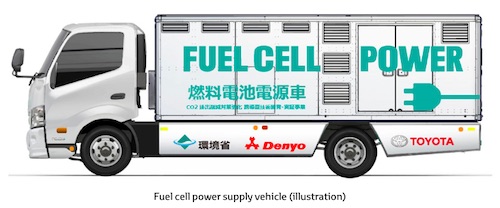Denyo and Toyota Jointly Develop and Start Verification Tests for Fuel Cell Power Supply Vehicle that Uses Hydrogen to Generate Electricity
- Written by ACN Newswire - Press Releases
|
|
|
|
Denyo and Toyota are both actively engaged in efforts for the global environment as they see related problems as important issues for management. As such, they have jointly developed the fuel cell power supply vehicle based on a belief that making efforts to apply fuel cell technologies to commercial and industrial vehicles is needed to further reduce CO2 emissions. Together, the two companies have also pursued further possibilities wherein electrified vehicles, considered one important way that they can demonstrate their belief and provide back to society, are able to provide added value as a large-scaled power supply, delivering electricity when and where it is needed in a range of scenarios including disaster-stricken areas without power and entertainment venues such as outdoor concerts.
Many of the current generation of power supply vehicles use diesel engines to provide power to the vehicle on the road and when generating electricity. Using fossil fuels as energy, they emit substances of environmental concern when driving and generating electricity, including the greenhouse gases, carbon dioxide (CO2) and nitrogen oxide (NOx). Fuel cell power supply vehicles, on the other hand, use fuel cells to provide power. This eliminates the emission of substances of environmental concern, enables up to approximately 72 hours of continuous power supply, and provides water for showers and other uses as a by-product of power generation.
The Toyota/Denyo fuel cell power supply vehicle that was jointly developed this time is based on Toyota's "Dyna" light-duty trucks, equipped with the fuel cell system of Toyota's Mirai Fuel Cell Electric Vehicle (FCEV) as its power source. For its power supply unit, it uses a fuel cell power supply equipment developed by Denyo under a program subsidized by the Ministry of the Environment(2). The vehicle also carries about 65 kilograms of hydrogen (in 27 hydrogen tanks) for traveling long distances and generating power for long periods of time.
Verification tests for the vehicle will start in September 2020. It will be compared against conventional engine-based power generators to verify the unique characteristics of fuel cell power supply vehicles, including their impact on various load equipment and reductions of CO2 emissions.
As a socially responsible company, Denyo is actively engaged in business activities that are in harmony with the environment, and will also continue to actively develop fuel cell-based products as a leading manufacturer of mobile (portable) generators.
Toyota wants to dramatically reduce on-road CO2 emissions, which is one of its activities to help create a sustainable society targeted by the SDGs. To do so, the company will continue working hard to develop and promote the use of electrified vehicles, moving forward.
(1) The Sustainable Development Goals (SDGs), adopted at the General Assembly of the United Nations in September 2015, are a set of international goals to be met by 2030. They are a comprehensive collection of 17 goals (social challenges) that can realize a sustainable society.(2) "Low Carbon Technology Research and Development Program," Ministry of the Environment Government of Japan
About Toyota Motor Corporation
Toyota Motor Corporation (TMC) is the global mobility company that introduced the Prius hybrid-electric car in 1997 and the first mass-produced fuel cell sedan, Mirai, in 2014. Headquartered in Toyota City, Japan, Toyota has been making cars since 1937. Today, Toyota proudly employs 370,000 employees in communities around the world. Together, they build around 10 million vehicles per year in 29 countries, from mainstream cars and premium vehicles to mini-vehicles and commercial trucks, and sell them in more than 170 countries under the brands Toyota, Lexus, Daihatsu and Hino. For more information, please visit www.toyota-global.com.
Copyright 2020 JCN Newswire. All rights reserved. www.jcnnewswire.com
Authors: ACN Newswire - Press Releases
Read more //?#



